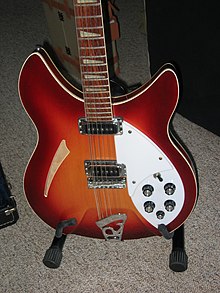This article needs additional citations for verification. (March 2009) |
| Rickenbacker 360/12 | |
|---|---|
 | |
| Manufacturer | Rickenbacker |
| Period | 1963 - Present |
| Construction | |
| Body type | Semi-Hollow |
| Neck joint | Set Neck |
| Woods | |
| Body | Maple Carved, with white plastic binding along the back |
| Neck | Three-piece Maple |
| Fretboard | Rosewood with pearloid triangle inlays and white plastic binding or similarly configured, sealed Ebony on custom ordered instruments. |
| Hardware | |
| Bridge | Adjustable |
| Pickup(s) | Two Single-coil pickups Nickel Chrome standard, Gold and Black Chrome custom order |
| Colors available | |
| Mapleglo (natural), Fireglo (sunburst), Jetglo (black), Midnight Blue, Ruby* (bright red) - *not available all years except by custom order. | |
The Rickenbacker 360/12 is the Rickenbacker company's 12-string variant of their 360 electric guitar model. Mainly known for producing "jangly" sounds, it was among the first electric 12-string guitars. The 360/12 was given worldwide attention when George Harrison used it on many Beatles recordings, introducing the distinctive new sound of this guitar on "I Call Your Name", which the band recorded in March 1964.[1] In the late 1960s, the company made alternative models such as the Rickenbacker 370/12, which became the favored instrument of Roger McGuinn of the Byrds.
Rickenbacker used an innovative headstock design that incorporates both a slotted-style peghead and a solid peghead, thereby eliminating the need for the larger headstock normally associated with a 12-string guitar. Another feature unique to Rickenbacker 12-strings is the ordering of the courses. Most 12-strings have the octave course on the bass side of the standard course; Rickenbacker reverses this convention. This feature along with the semi-hollow body design and thru-body neck structure contribute to its unique timbre.